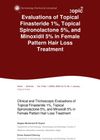2 citations,
July 2022 in “BioMed Research International” Finasteride-loaded nanogels are effective, safe, and improve drug absorption through the skin.
2 citations,
May 2022 in “International Journal of Impotence Research” Finasteride may be linked to Peyronie’s disease, but more research is needed.
2 citations,
March 2021 in “Reproduction” Finasteride may affect male fertility by interfering with specific sperm signaling.
[object Object]  1 citations,
August 2024 in “Skin Research and Technology”
1 citations,
August 2024 in “Skin Research and Technology” There is no causal relationship between androgenetic alopecia and serum uric acid.
 1 citations,
August 2023 in “Andrology”
1 citations,
August 2023 in “Andrology” Finasteride changes hormone levels and certain proteins in rats, but these effects can be reversed after stopping the drug.
1 citations,
September 2021 in “Pharmaceutics” High-dose finasteride may help treat glioblastoma but needs localized delivery for effectiveness.
1 citations,
June 2021 in “Singapore Medical Journal” Dutasteride and finasteride can help increase hair growth gene expression but need further improvement.
1 citations,
January 2021 in “European Journal of Inflammation” Methylated flavonoids may effectively reduce depression and inflammation caused by finasteride.
1 citations,
January 2020 in “Egyptian Journal of Dermatology and Venereology” Higher testosterone and DHT levels are linked to hair loss in men, but not to prostate cancer risk.
 1 citations,
October 2018 in “InTech eBooks”
1 citations,
October 2018 in “InTech eBooks” Only minoxidil and finasteride are FDA-approved for hair loss, with other treatments available but less effective or with side effects.
[object Object]  1 citations,
August 2015 in “Journal of the Korean neurological association”
1 citations,
August 2015 in “Journal of the Korean neurological association” A man had a rare stroke possibly due to taking finasteride, which might have increased his hormone levels causing a blood clot. His memory loss didn't fully recover even after stopping the medication.
 1 citations,
January 2015 in “Springer eBooks”
1 citations,
January 2015 in “Springer eBooks” AGA is a common hair loss disorder, and early diagnosis and treatment with minoxidil or finasteride can help reduce emotional distress.
 1 citations,
January 2011
1 citations,
January 2011 The document concludes that androgenetic alopecia is common, has a genetic link, and can be diagnosed and treated with medications like finasteride and minoxidil.
1 citations,
November 2010 in “Anticancer Research”  1 citations,
January 2009 in “CRC Press eBooks”
1 citations,
January 2009 in “CRC Press eBooks” Finasteride increases hair count and improves hair growth with low risk of side effects.
 1 citations,
January 2009 in “Drug delivery system”
1 citations,
January 2009 in “Drug delivery system” Anti-aging treatments like hair transplants, minoxidil, and finasteride effectively promote hair growth.
 1 citations,
January 2008 in “Actas Dermo-Sifiliográficas”
1 citations,
January 2008 in “Actas Dermo-Sifiliográficas” Treat hair loss in postmenopausal women with diet, avoiding certain drugs, and using medications like minoxidil or finasteride.
 January 2025 in “Dermatology Practical & Conceptual”
January 2025 in “Dermatology Practical & Conceptual” Topical finasteride is as effective and safe as minoxidil for treating female pattern hair loss.

The serum effectively promotes hair growth and reduces gray hair without side effects.
 December 2024 in “Frontiers in Neurology”
December 2024 in “Frontiers in Neurology” Testosterone with finasteride improved muscle and bone health in men with spinal cord injury.
August 2024 in “Journal of Controlled Release” A new treatment using hybrid vesicles with gold nanoparticles and finasteride significantly improves hair regrowth for androgenetic alopecia.
 June 2024 in “Trends in Urology & Men s Health”
June 2024 in “Trends in Urology & Men s Health” Post-finasteride syndrome is rare but serious and should be taken seriously.
 May 2024 in “Deleted Journal”
May 2024 in “Deleted Journal” Dutasteride effectively treats hair loss in men who don't respond to finasteride.
 May 2024 in “Journal of cosmetic dermatology”
May 2024 in “Journal of cosmetic dermatology” Topical finasteride/minoxidil is effective but not better than oral finasteride for hair loss.
 January 2024 in “Journal of lipid research”
January 2024 in “Journal of lipid research” Finasteride may lower cholesterol and slow heart disease progression.
 December 2023 in “Annals of phytomedicine”
December 2023 in “Annals of phytomedicine” Dutasteride is more effective than finasteride for hair loss treatment.
 November 2023 in “Frontiers in Neuroendocrinology”
November 2023 in “Frontiers in Neuroendocrinology” Some people experience lasting sexual, psychological, and sleep problems after using finasteride or SSRI antidepressants, possibly due to similar underlying causes.
 November 2023 in “International Journal of Pharmaceutics”
November 2023 in “International Journal of Pharmaceutics” The new delivery system improves treatment for hair loss by enhancing drug absorption and effectiveness.
 October 2023 in “Georgetown medical review”
October 2023 in “Georgetown medical review” Finasteride and Dutasteride can improve hair growth in male baldness but may cause temporary sexual dysfunction and possibly affect fertility.
 October 2023 in “Journal of Cosmetic Dermatology”
October 2023 in “Journal of Cosmetic Dermatology” Using both minoxidil and finasteride together is more effective for hair growth than using either one alone in men with hair loss.




















